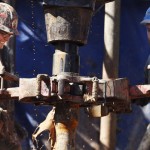Selling off our resources, promoting fossil fuels, destabilizes Canada's economy.
by David Suzuki
Energy is on everyone’s minds these days. Prime Minister Stephen Harper is determined to make Canada an energy superpower, fuelled mostly by Alberta’s tar sands.
Meanwhile, Alberta Premier Alison Redford, elected to lead a province with a strong economy, now finds energy price fluctuations are reducing provincial revenues. Saskatchewan is booming from oil, gas and uranium revenues, and BC Premier Christy Clark plans to vastly expand exploitation of liquefied natural gas, which requires huge amounts of energy and involves the highly contentious practice of fracking.
While Quebec Premier Pauline Marois maintains a moratorium on fracking, New Brunswick Premier David Alward claims it’s an energy opportunity for his province. Former Ontario Premier Dalton McGuinty’s progressive Green Energy Act is under serious attack, and Prime Minister Harper eagerly embraces exploration for oil as Arctic sea ice and tundra melt from the warming climate.
Although the federal government demonizes environmentalists as “radicals” bent on derailing exploitation plans for the tar sands and other natural resources, opposition is rising against pipelines to transport Alberta’s diluted bitumen to the BC coast via Enbridge’s Northern Gateway or to Texas refineries via the Keystone XL. Much of the oil would be exported to countries like China, where the extreme negative effects of fossil fuel pollution are increasing daily.
Politicians who want to make significant change must focus primarily on re-election if they are to see their agendas come to fruition. That means they must respond to immediate economic demands while leaving longer-term problems like climate change and water issues on the back burner. Surely the enduring consequences of today’s actions or inactions must be a priority. We’ll be living with the ramifications of the current crop of politicians’ decisions and actions long after they’ve been relegated to history.
Crisis is a powerful motivator, as we saw during the economic crash of 2008. In a matter of weeks, President George W Bush and his successor, Barack Obama, committed hundreds of billions of dollars to bail out banks and automobile companies – without imposing any conditions that might get them to change their ways. I was astounded at the speed and scale of these actions, compared to the ineffectual snail’s pace on ecological issues that threaten the survival of our species and our way of life and society.
The science has been in for more than two decades: Human use of fossil fuels creating unprecedented levels of greenhouse gases is altering the chemistry of the atmosphere, leading to climate and weather effects that will be chaotic and devastating. Continued increases in emissions will only exacerbate what is already an out-of-control atmospheric transformation of the biosphere – our only home.
We claim brainpower makes us superior to the rest of life on this planet. But what use is intelligence if we don’t use it to respond to threats and opportunities? After all, foresight was a great human attribute that brought us to a position of dominance on the planet. We used our knowledge and experiences to look ahead and recognize potential dangers and favourable circumstances so we could take some control over our destiny by acting to avoid hazards and exploit possibilities.
This is Canada’s moment. We are confronting a crisis with the economy and energy. No economy can grow forever; it is simply impossible on a finite planet. Shouldn’t we ask what an economy is for? How much is enough? What are the limits? How do we build a sustainable economy? We have learned from painful experience in single-resource communities that relying primarily on one major component of the economy — logging, fishing, mining — makes for dangerous boom-and-bust cycles.
Nations that export fossil fuel too often become overreliant on that sector. That destabilizes the economy (as we’re seeing in Alberta), distorts priorities (leading to the so-called “Dutch disease” where other parts of the economy are neglected or ignored) and undermines democracy by holding government hostage (as we saw in the enormous lobbying power of industry in the last US presidential election).
The future of energy in Canada will determine the fate of our society. It must be widely discussed, nationally as well as provincially, beyond the boundaries of politics and economics. This is about the type of country we will leave to our children and grandchildren.
Reference
Alberta’s Redford and oil prices
BC’s Christy Clark and LNG
Fracking
Ontario Green Energy Act
Oil and Arctic sea ice
Radical extremists
China pollution
No economy can grow forever
Dutch disease
Industry lobby and US election

 David T Suzuki, PhD, Chair of the David Suzuki Foundation, is an award-winning scientist, environmentalist and broadcaster.
David has received consistently high acclaim for his 30 years of award-winning work in broadcasting, explaining the complexities of science in a compelling, easily understood way. He is well known to millions as the host of the Canadian Broadcasting Corporation's popular science television series, The Nature of Things. An internationally respected geneticist, David was a full Professor at the University of British Columbia in Vancouver from 1969 until his retirement in 2001. He is professor emeritus with UBC's Sustainable Development Research Institute. From 1969 to 1972 he was the recipient of the prestigious EWR Steacie Memorial Fellowship Award for the "Outstanding Canadian
Research Scientist Under the Age of 35".
For more insights from David Suzuki, please read Everything Under the Sun (Greystone Books/David Suzuki Foundation), by David Suzuki and Ian Hanington, now available in bookstores and online.
This article is reprinted with permission.
David T Suzuki, PhD, Chair of the David Suzuki Foundation, is an award-winning scientist, environmentalist and broadcaster.
David has received consistently high acclaim for his 30 years of award-winning work in broadcasting, explaining the complexities of science in a compelling, easily understood way. He is well known to millions as the host of the Canadian Broadcasting Corporation's popular science television series, The Nature of Things. An internationally respected geneticist, David was a full Professor at the University of British Columbia in Vancouver from 1969 until his retirement in 2001. He is professor emeritus with UBC's Sustainable Development Research Institute. From 1969 to 1972 he was the recipient of the prestigious EWR Steacie Memorial Fellowship Award for the "Outstanding Canadian
Research Scientist Under the Age of 35".
For more insights from David Suzuki, please read Everything Under the Sun (Greystone Books/David Suzuki Foundation), by David Suzuki and Ian Hanington, now available in bookstores and online.
This article is reprinted with permission.






